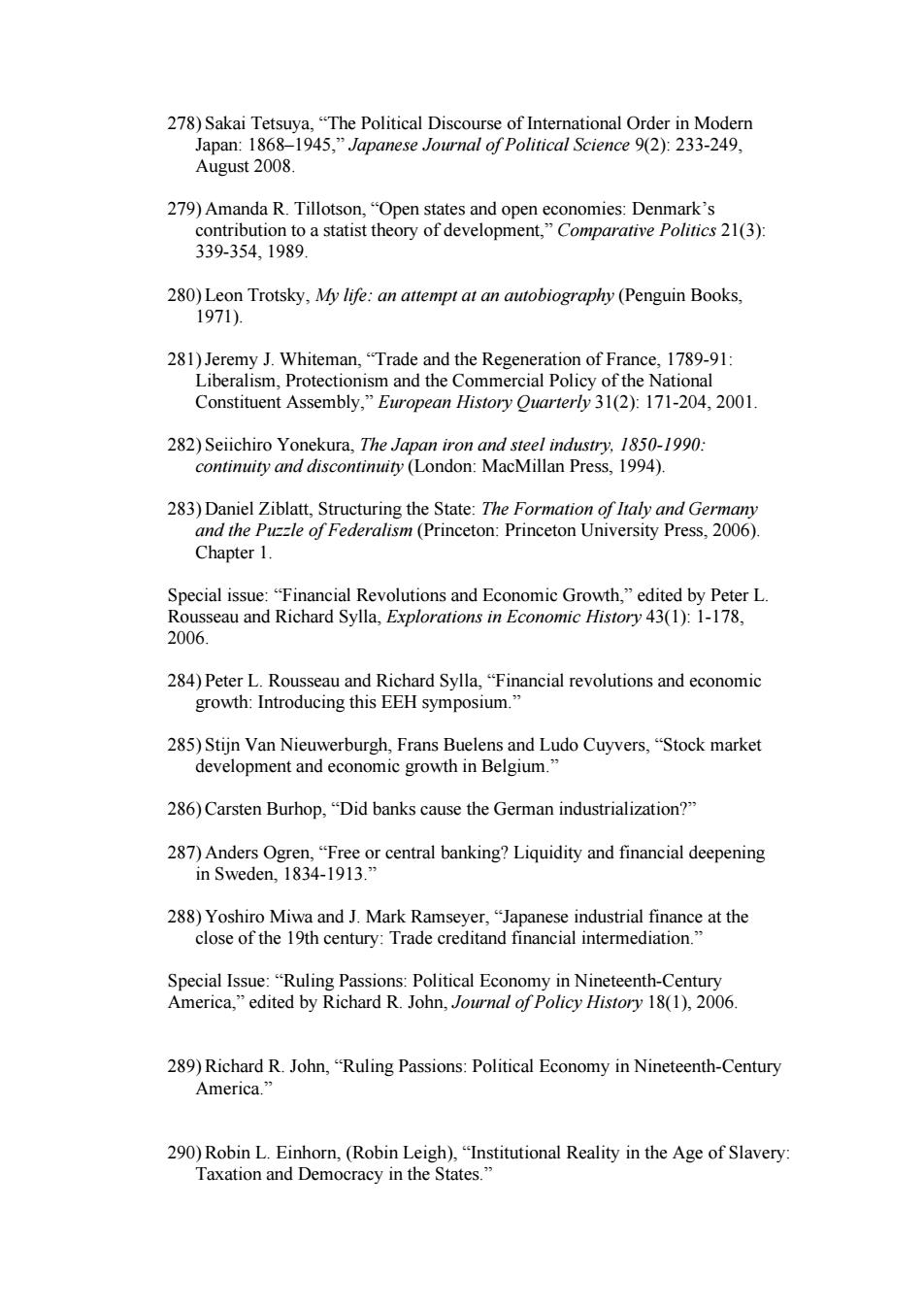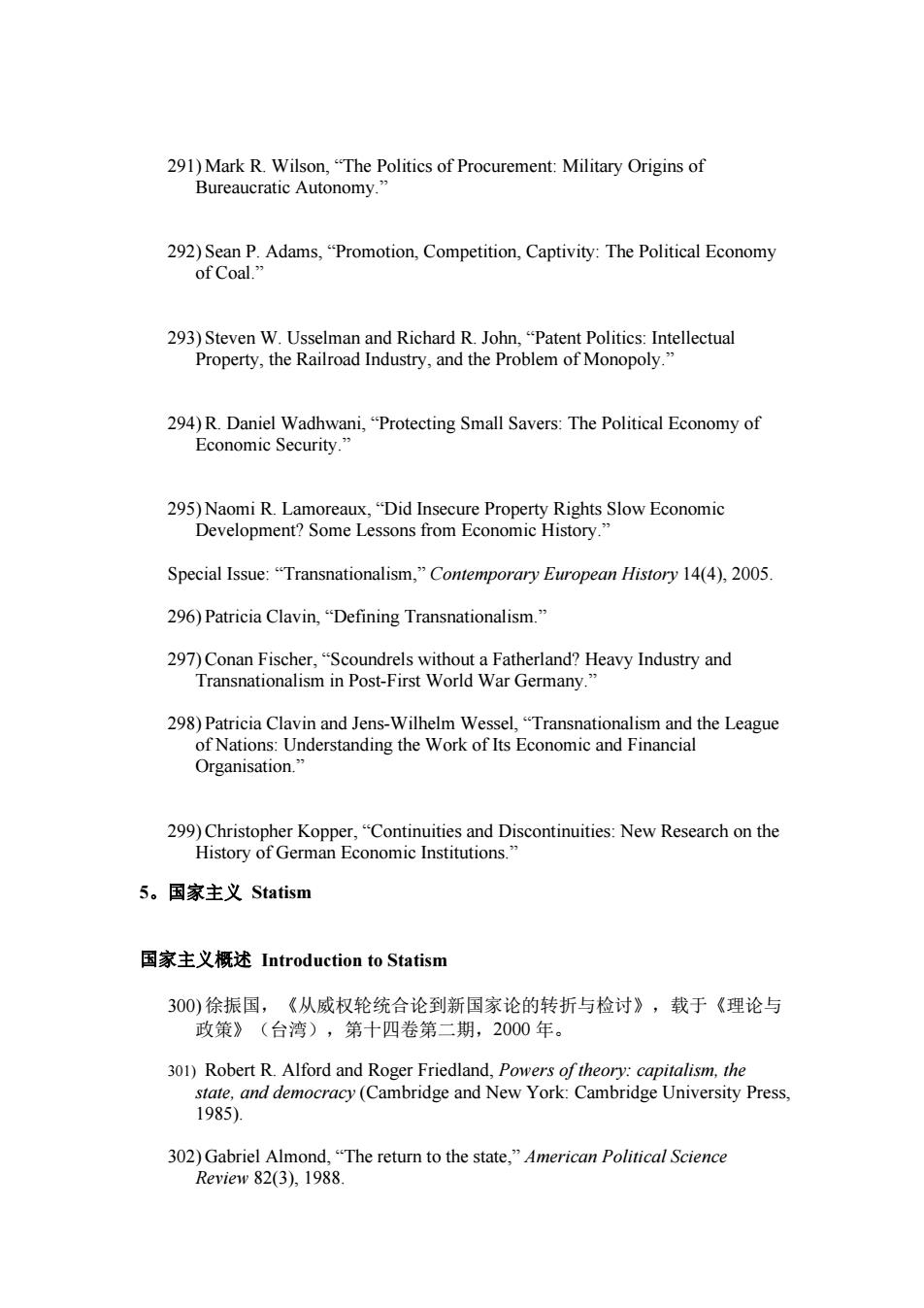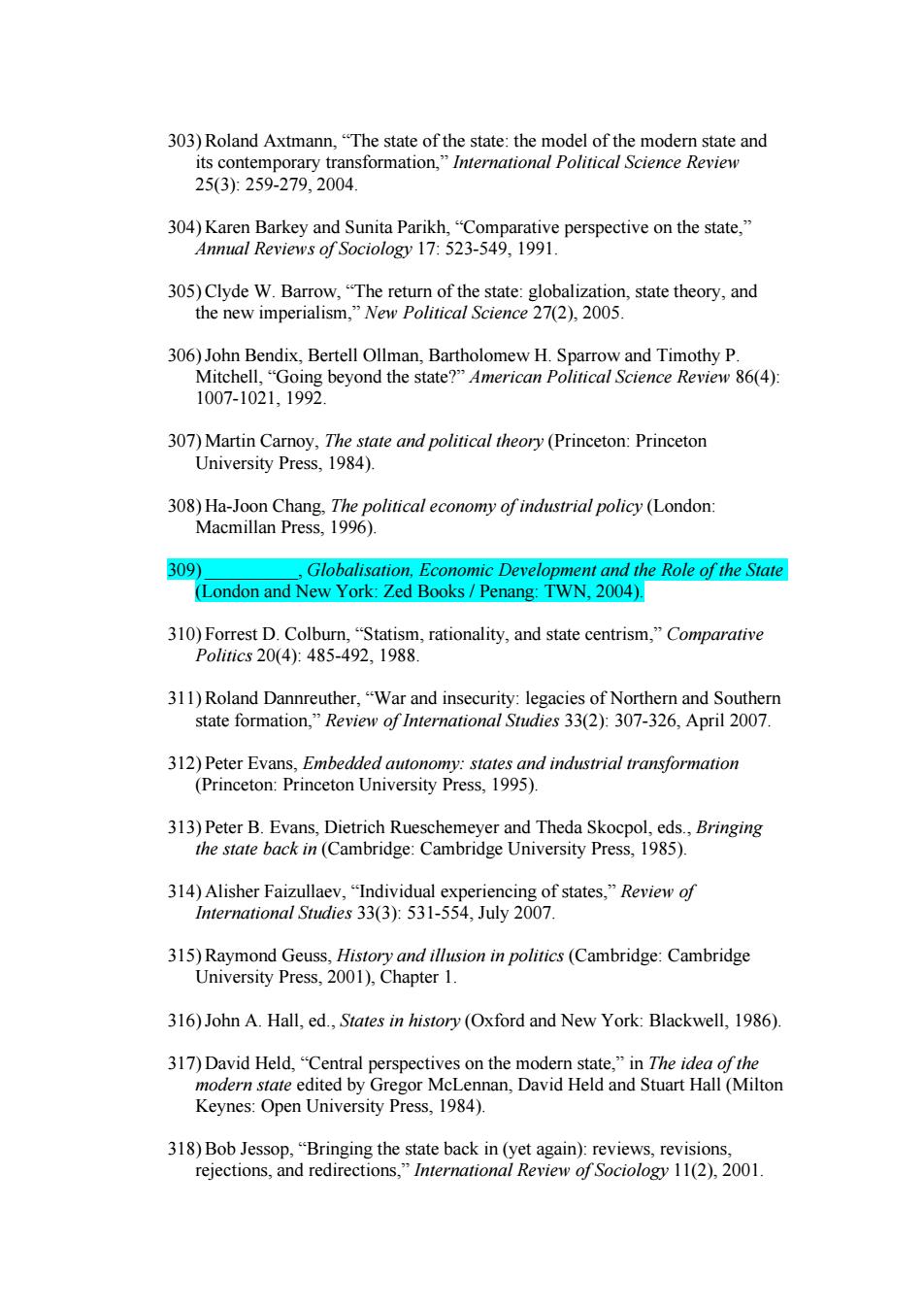
278)Sakai Tetsuya,"The Political Discourse of International Order in Modern Japan:1868-1945,"Japanese Journal of Political Science 9(2):233-249, August 2008 279)Amanda R.Tillotson,"Open states and open economies:Denmark's contribution to a statist theory of development,"Comparative Politics 21(3) 339-354,1989. 280)Leon Trotsky,My life:an attempt at an autobiography(Penguin Books, 1971). 281)Jeremy J.Whiteman,"Trade and the Regeneration of France,1789-91: Liberalism,Protectionism and the Commercial Policy of the National Constituent Assembly,"European History Quarterly 31(2):171-204,2001 282)Seiichiro Yonekura,The Japan iron and steel industry,1850-1990: continuity and discontinuity (London:MacMillan Press,1994). 283)Daniel Ziblatt,Structuring the State:The Formation of Italy and Germany and the Puzzle of Federalism(Princeton:Princeton University Press,2006). Chapter 1. Special issue:"Financial Revolutions and Economic Growth,"edited by Peter L. Rousseau and Richard Sylla,Explorations in Economic History 43(1):1-178, 2006 284)Peter L.Rousseau and Richard Sylla,"Financial revolutions and economic growth:Introducing this EEH symposium." 285)Stijn Van Nieuwerburgh,Frans Buelens and Ludo Cuyvers,"Stock market development and economic growth in Belgium." 286)Carsten Burhop,"Did banks cause the German industrialization?" 287)Anders Ogren,"Free or central banking?Liquidity and financial deepening in Sweden,1834-1913." 288)Yoshiro Miwa and J.Mark Ramseyer,"Japanese industrial finance at the close of the 19th century:Trade creditand financial intermediation." Special Issue:"Ruling Passions:Political Economy in Nineteenth-Century America,"edited by Richard R.John,Journal of Policy History 18(1),2006. 289)Richard R.John,"Ruling Passions:Political Economy in Nineteenth-Century America.” 290)Robin L.Einhorn,(Robin Leigh),"Institutional Reality in the Age of Slavery: Taxation and Democracy in the States
278) Sakai Tetsuya, “The Political Discourse of International Order in Modern Japan: 1868–1945,” Japanese Journal of Political Science 9(2): 233-249, August 2008. 279) Amanda R. Tillotson, “Open states and open economies: Denmark’s contribution to a statist theory of development,” Comparative Politics 21(3): 339-354, 1989. 280) Leon Trotsky, My life: an attempt at an autobiography (Penguin Books, 1971). 281)Jeremy J. Whiteman, “Trade and the Regeneration of France, 1789-91: Liberalism, Protectionism and the Commercial Policy of the National Constituent Assembly,” European History Quarterly 31(2): 171-204, 2001. 282) Seiichiro Yonekura, The Japan iron and steel industry, 1850-1990: continuity and discontinuity (London: MacMillan Press, 1994). 283) Daniel Ziblatt, Structuring the State: The Formation of Italy and Germany and the Puzzle of Federalism (Princeton: Princeton University Press, 2006). Chapter 1. Special issue: “Financial Revolutions and Economic Growth,” edited by Peter L. Rousseau and Richard Sylla, Explorations in Economic History 43(1): 1-178, 2006. 284) Peter L. Rousseau and Richard Sylla, “Financial revolutions and economic growth: Introducing this EEH symposium.” 285) Stijn Van Nieuwerburgh, Frans Buelens and Ludo Cuyvers, “Stock market development and economic growth in Belgium.” 286) Carsten Burhop, “Did banks cause the German industrialization?” 287) Anders Ogren, “Free or central banking? Liquidity and financial deepening in Sweden, 1834-1913.” 288) Yoshiro Miwa and J. Mark Ramseyer, “Japanese industrial finance at the close of the 19th century: Trade creditand financial intermediation.” Special Issue: “Ruling Passions: Political Economy in Nineteenth-Century America,” edited by Richard R. John, Journal of Policy History 18(1), 2006. 289) Richard R. John, “Ruling Passions: Political Economy in Nineteenth-Century America.” 290) Robin L. Einhorn, (Robin Leigh), “Institutional Reality in the Age of Slavery: Taxation and Democracy in the States

291)Mark R.Wilson,"The Politics of Procurement:Military Origins of Bureaucratic Autonomy." 292)Sean P.Adams,"Promotion,Competition,Captivity:The Political Economy of Coal.” 293)Steven W.Usselman and Richard R.John,"Patent Politics:Intellectual Property,the Railroad Industry,and the Problem of Monopoly." 294)R.Daniel Wadhwani,"Protecting Small Savers:The Political Economy of Economic Security.” 295)Naomi R.Lamoreaux,"Did Insecure Property Rights Slow Economic Development?Some Lessons from Economic History." Special Issue:"Transnationalism,"Contemporary European History 14(4),2005. 296)Patricia Clavin,"Defining Transnationalism." 297)Conan Fischer,"Scoundrels without a Fatherland?Heavy Industry and Transnationalism in Post-First World War Germany." 298)Patricia Clavin and Jens-Wilhelm Wessel,"Transnationalism and the League of Nations:Understanding the Work of Its Economic and Financial Organisation." 299)Christopher Kopper,"Continuities and Discontinuities:New Research on the History of German Economic Institutions." 5。国家主义Statism 国家主义概述Introduction to Statism 300)徐振国,《从威权轮统合论到新国家论的转折与检讨》,载于《理论与 政策》(台湾),第十四卷第二期,2000年。 301)Robert R.Alford and Roger Friedland,Powers of theory:capitalism,the state,and democracy (Cambridge and New York:Cambridge University Press, 1985) 302)Gabriel Almond,"The return to the state,"American Political Science Review82(3),1988
291) Mark R. Wilson, “The Politics of Procurement: Military Origins of Bureaucratic Autonomy.” 292) Sean P. Adams, “Promotion, Competition, Captivity: The Political Economy of Coal.” 293) Steven W. Usselman and Richard R. John, “Patent Politics: Intellectual Property, the Railroad Industry, and the Problem of Monopoly.” 294) R. Daniel Wadhwani, “Protecting Small Savers: The Political Economy of Economic Security.” 295) Naomi R. Lamoreaux, “Did Insecure Property Rights Slow Economic Development? Some Lessons from Economic History.” Special Issue: “Transnationalism,” Contemporary European History 14(4), 2005. 296) Patricia Clavin, “Defining Transnationalism.” 297) Conan Fischer, “Scoundrels without a Fatherland? Heavy Industry and Transnationalism in Post-First World War Germany.” 298) Patricia Clavin and Jens-Wilhelm Wessel, “Transnationalism and the League of Nations: Understanding the Work of Its Economic and Financial Organisation.” 299) Christopher Kopper, “Continuities and Discontinuities: New Research on the History of German Economic Institutions.” 5。国家主义 Statism 国家主义概述 Introduction to Statism 300) 徐振国,《从威权轮统合论到新国家论的转折与检讨》,载于《理论与 政策》(台湾),第十四卷第二期,2000 年。 301) Robert R. Alford and Roger Friedland, Powers of theory: capitalism, the state, and democracy (Cambridge and New York: Cambridge University Press, 1985). 302) Gabriel Almond, “The return to the state,” American Political Science Review 82(3), 1988

303)Roland Axtmann,"The state of the state:the model of the modern state and its contemporary transformation,"International Political Science Review 25(3):259-279,2004 304)Karen Barkey and Sunita Parikh,"Comparative perspective on the state," Annual Reviews of Sociology 17:523-549,1991. 305)Clyde W.Barrow,"The return of the state:globalization,state theory,and the new imperialism,"New Political Science 27(2),2005. 306)John Bendix,Bertell Ollman,Bartholomew H.Sparrow and Timothy P. Mitchell,"Going beyond the state?"American Political Science Review 86(4): 1007-1021.1992 307)Martin Carnoy,The state and political theory (Princeton:Princeton University Press,1984). 308)Ha-Joon Chang,The political economy ofindustrial policy (London: Macmillan Press,1996). 309 Globalisation,Economic Development and the Role of the State (London and New York:Zed Books Penang:TWN,2004). 310)Forrest D.Colburn,"Statism,rationality,and state centrism,"Comparative Politics20(4):485-492,1988 311)Roland Dannreuther,"War and insecurity:legacies of Northern and Southern state formation,"Review of International Studies 33(2):307-326,April 2007. 312)Peter Evans,Embedded autonomy:states and industrial transformation (Princeton:Princeton University Press,1995). 313)Peter B.Evans,Dietrich Rueschemeyer and Theda Skocpol,eds.,Bringing the state back in (Cambridge:Cambridge University Press,1985) 314)Alisher Faizullaev,"Individual experiencing of states,"Review of International Studies 33(3):531-554,July 2007. 315)Raymond Geuss,History and illusion in politics(Cambridge:Cambridge University Press,2001),Chapter 1. 316)John A.Hall,ed.,States in history (Oxford and New York:Blackwell,1986) 317)David Held,"Central perspectives on the modern state,"in The idea of the modern state edited by Gregor McLennan,David Held and Stuart Hall (Milton Keynes:Open University Press,1984). 318)Bob Jessop,"Bringing the state back in(yet again):reviews,revisions, rejections,and redirections,"International Review ofSociology 11(2),2001
303) Roland Axtmann, “The state of the state: the model of the modern state and its contemporary transformation,” International Political Science Review 25(3): 259-279, 2004. 304) Karen Barkey and Sunita Parikh, “Comparative perspective on the state,” Annual Reviews of Sociology 17: 523-549, 1991. 305) Clyde W. Barrow, “The return of the state: globalization, state theory, and the new imperialism,” New Political Science 27(2), 2005. 306)John Bendix, Bertell Ollman, Bartholomew H. Sparrow and Timothy P. Mitchell, “Going beyond the state?” American Political Science Review 86(4): 1007-1021, 1992. 307) Martin Carnoy, The state and political theory (Princeton: Princeton University Press, 1984). 308) Ha-Joon Chang, The political economy of industrial policy (London: Macmillan Press, 1996). 309) __________, Globalisation, Economic Development and the Role of the State (London and New York: Zed Books / Penang: TWN, 2004). 310) Forrest D. Colburn, “Statism, rationality, and state centrism,” Comparative Politics 20(4): 485-492, 1988. 311) Roland Dannreuther, “War and insecurity: legacies of Northern and Southern state formation,” Review of International Studies 33(2): 307-326, April 2007. 312) Peter Evans, Embedded autonomy: states and industrial transformation (Princeton: Princeton University Press, 1995). 313) Peter B. Evans, Dietrich Rueschemeyer and Theda Skocpol, eds., Bringing the state back in (Cambridge: Cambridge University Press, 1985). 314) Alisher Faizullaev, “Individual experiencing of states,” Review of International Studies 33(3): 531-554, July 2007. 315) Raymond Geuss, History and illusion in politics (Cambridge: Cambridge University Press, 2001), Chapter 1. 316)John A. Hall, ed., States in history (Oxford and New York: Blackwell, 1986). 317) David Held, “Central perspectives on the modern state,” in The idea of the modern state edited by Gregor McLennan, David Held and Stuart Hall (Milton Keynes: Open University Press, 1984). 318) Bob Jessop, “Bringing the state back in (yet again): reviews, revisions, rejections, and redirections,” International Review of Sociology 11(2), 2001

319) State power:a strategic-relational approach (Cambridge Polity Press,2008). 320)Philip Kasinitz,"Neo-Marxist view of the state,"Dissent 30(3):337-346, 1983 321)Peter Katzenstein,"Conclusion:domestic structures and strategies of foreign economic policy,"in Between power and plenty:foreign economic policies of advanced industrial states edited by Peter Katzenstein (Madison:University of Wisconsin Press,1978). 322)Atul Kohli,"State,society,and development",in Political science:the state of the discipline edited by Ira Katznelson and Helen Milner (New York:WW Norton,2002). 323)Martijn Konings,"Political Institutions and Economic Imperatives:Bringing Agency Back In,"Research in Political Economy 22:85-130,2005. 324)Stephen D.Krasner,Defending the national interest:raw materials investments and U.S.foreign policy (Princeton:Princeton University Press, 1978). 325) ,"Approaches to the state:alternative conceptions and historical dynamics,"Comparative Politics 16(2):223-246,1984. 326)Howard H.Lentner,"The concept of the state:a response to Stephen Krasner,"Comparative Politics 16(3):367-377,1984. 327)Michael Mann,"Putting the Weberian State in its Social,Geopolitical and Militaristic Context:A Response to Patrick O'Brien,"Journal of Historical Sociology 19(4),2006. 328)Harvey C.Mansfield,Jr.,"On the impersonality of the modern state:a comment on Machiavelli's use of stato,"American Political Science Review 77(4):849-857,1983 329)Ralph Miliband,The State in Capitalist Society:The Analysis of the Western System of Power (London,Melbourne and New York:Quarter Books,1970). 330)J.P.Nettl,"The state as a conceptual variable,"World Politics 20(4): 559-592,1968. 331)Eric A.Nordlinger,On the autonomy of the democratic state (Cambridge, Mass.:Harvard University Press,1981). 332)Eric A.Nordlinger,Theodore J.Lowi,and Sergio Fabbrini,"The return to the state:critiques,"American Political Science Review 82(3):875-901,1988
319) __________, State power: a strategic-relational approach (Cambridge: Polity Press, 2008). 320) Philip Kasinitz, “Neo-Marxist view of the state,” Dissent 30(3): 337-346, 1983. 321) Peter Katzenstein, “Conclusion: domestic structures and strategies of foreign economic policy,” in Between power and plenty: foreign economic policies of advanced industrial states edited by Peter Katzenstein (Madison: University of Wisconsin Press, 1978). 322) Atul Kohli, “State, society, and development”, in Political science: the state of the discipline edited by Ira Katznelson and Helen Milner (New York: WW Norton, 2002). 323) Martijn Konings, “Political Institutions and Economic Imperatives: Bringing Agency Back In,” Research in Political Economy 22: 85-130, 2005. 324) Stephen D. Krasner, Defending the national interest: raw materials investments and U.S. foreign policy (Princeton: Princeton University Press, 1978). 325) __________, “Approaches to the state: alternative conceptions and historical dynamics,” Comparative Politics 16(2): 223-246, 1984. 326) Howard H. Lentner, “The concept of the state: a response to Stephen Krasner,” Comparative Politics 16(3): 367-377, 1984. 327) Michael Mann, “Putting the Weberian State in its Social, Geopolitical and Militaristic Context: A Response to Patrick O'Brien,” Journal of Historical Sociology 19(4), 2006. 328) Harvey C. Mansfield, Jr., “On the impersonality of the modern state: a comment on Machiavelli’s use of stato,” American Political Science Review 77(4): 849-857, 1983. 329) Ralph Miliband, The State in Capitalist Society: The Analysis of the Western System of Power (London, Melbourne and New York: Quarter Books, 1970). 330)J. P. Nettl, “The state as a conceptual variable,” World Politics 20(4): 559-592, 1968. 331) Eric A. Nordlinger, On the autonomy of the democratic state (Cambridge, Mass.: Harvard University Press, 1981). 332) Eric A. Nordlinger, Theodore J. Lowi, and Sergio Fabbrini, “The return to the state: critiques,” American Political Science Review 82(3): 875-901, 1988

333)Patrick Karl O'Brien,"Contentions of the Purse between England and its European Rivals from Henry V to George IV:a Conversation with Michael Mann,"Journal of Historical Sociology 19(4),2006. 334)Ian Palmer,"State Theory and Statutory Authorities:Points of Convergence,"Sociology 19(4):523-540,1985. 335)Jorgen Dige Pedersen,"Explaining economic liberalization in India:state and society perspectives,"World Development 28(2):265-282,2000. 336)Nicola Phillips,"Bridging the comparative/international divide in the study of states,"New Political Economy 10(3),2005. 337)Christopher Pierson,"New Theories of State and Civil Society Recent Developments in Post-Marxist Analysis of the State,"Sociology 18(4), November 1984. 338) The Modern State (London and New York:Routledge,1996) 339)Gianfranco Poggi,The development of the modern state:a sociological introduction (London:Hutchinson Co,1978). 340)Edward L.Rubin,Beyond Camelot:rethinking politics and law for the modern state (Princeton:Princeton University Press,2005).Chapter 1. 341)Eduardo Silva,"From dictatorship to democracy:the business-state nexus in Chile's economic transformation,1975-1994,"Comparative Politics 28(3): 299-320,1996 342)Theda Skocpol,"Bringing the state back in:strategies of analysis in current research,"in Bringing the state back in edited by Peter B.Evans,Dietrich Rueschemeyer,and Theda Skocpol(Cambridge:Cambridge University Press, 1985) 343) "Bringing the State Back In:Retrospect and Prospect-The 2007 Johan Skytte Prize Lecture,"Scandinavian Political Studies 31(2),May 2008 344)Alfred Stepan,The state and society:Peru in comparative perspective (Princeton:Princeton University Press,1978). 345)Helen Thompson,"The Modern State and its Adversaries,"Government and Opposition 41(1),2006. 346)Charles Tilly,Coercion,capital,and European states,AD 990-1992 (Cambridge (Mass.)and Oxford:Blackwell,1992). 347)Ellen Kay Trimberger,Revolution from above:military bureaucrats and development in Japan,Turkey,Egypt,and Peru (New Brunswick:Transaction Books,1978)
333) Patrick Karl O’Brien, “Contentions of the Purse between England and its European Rivals from Henry V to George IV: a Conversation with Michael Mann,” Journal of Historical Sociology 19(4), 2006. 334) Ian Palmer, “State Theory and Statutory Authorities: Points of Convergence,” Sociology 19(4): 523-540, 1985. 335)Jorgen Dige Pedersen, “Explaining economic liberalization in India: state and society perspectives,” World Development 28(2): 265-282, 2000. 336) Nicola Phillips, “Bridging the comparative/international divide in the study of states,” New Political Economy 10(3), 2005. 337) Christopher Pierson, “New Theories of State and Civil Society Recent Developments in Post-Marxist Analysis of the State,” Sociology 18(4), November 1984. 338) __________, The Modern State (London and New York: Routledge, 1996). 339) Gianfranco Poggi, The development of the modern state: a sociological introduction (London: Hutchinson & Co, 1978). 340) Edward L. Rubin, Beyond Camelot: rethinking politics and law for the modern state (Princeton: Princeton University Press, 2005). Chapter 1. 341) Eduardo Silva, “From dictatorship to democracy: the business-state nexus in Chile’s economic transformation, 1975-1994,” Comparative Politics 28(3): 299-320, 1996. 342) Theda Skocpol, “Bringing the state back in: strategies of analysis in current research,” in Bringing the state back in edited by Peter B. Evans, Dietrich Rueschemeyer, and Theda Skocpol (Cambridge: Cambridge University Press, 1985). 343) __________, “Bringing the State Back In: Retrospect and Prospect - The 2007 Johan Skytte Prize Lecture,” Scandinavian Political Studies 31(2), May 2008. 344) Alfred Stepan, The state and society: Peru in comparative perspective (Princeton: Princeton University Press, 1978). 345) Helen Thompson, “The Modern State and its Adversaries,” Government and Opposition 41(1), 2006. 346) Charles Tilly, Coercion, capital, and European states, AD 990-1992 (Cambridge (Mass.) and Oxford: Blackwell, 1992). 347) Ellen Kay Trimberger, Revolution from above: military bureaucrats and development in Japan, Turkey, Egypt, and Peru (New Brunswick: Transaction Books, 1978)